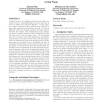Free Online Productivity Tools
i2Speak
i2Symbol
i2OCR
iTex2Img
iWeb2Print
iWeb2Shot
i2Type
iPdf2Split
iPdf2Merge
i2Bopomofo
i2Arabic
i2Style
i2Image
i2PDF
iLatex2Rtf
Sci2ools
MOBICOM
2009
ACM
2009
ACM
Revenue maximization and distributed power allocation in cognitive radio networks
Cognitive radio is an enabling technology that allows unlicensed users to opportunistically access the spectrum in order to enhance the spectrum efficiency. In this paper, we consider a cognitive system wherein there exists a primary relay network and a secondary network. In order to efficiently exploit the available spectrum and gain revenues whenever the primary relay infrastructure is not utilized, the primary network leases its unused bandwidth and the idle relay node to the secondary users. As a reimbursement, the secondary users make payments to the primary network based on the service they receive. We first characterize the interactions between the primary and secondary users using a buyer/seller model. Specifically, the price is determined by the primary network such that the revenue is maximized. On the buyer side, given the specified price, the secondary users competitively access the spectrum and employ the primary relay node to forward their packets. Then, we model each...
Related Content
| Added | 28 May 2010 |
| Updated | 28 May 2010 |
| Type | Conference |
| Year | 2009 |
| Where | MOBICOM |
| Authors | Shaolei Ren, Mihaela van der Schaar |
Comments (0)

